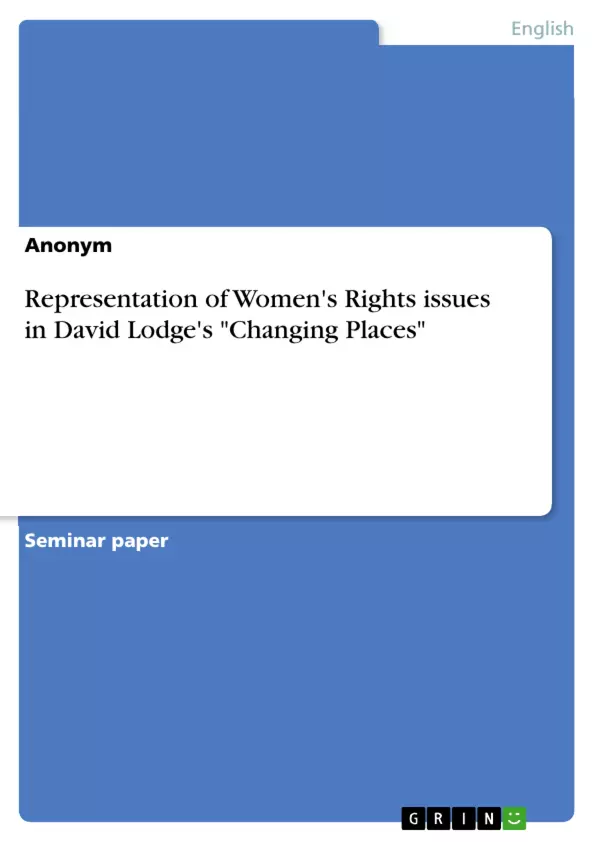This term paper deals with the topic of Women's Rights in the 1960s in Britain and the United States by especially examining abortion rights issues. The statements used in this term paper are supported by the novel "Changing Places" by the English author and literary critic David Lodge.
The Abortion Act of 1967 in Britain was a central occasion in the Women's Liberation Movement, as women were now free to choose between keeping a child or aborting it, even though an abortion required certain reasons. But this was not the only change in the Women's Liberation Movement. Women started to get more rights in keeping a part of the money their husbands gave them. Women furthermore started to get involved in politics, since the first female Secretary of State in Britain was appointed in 1968 and the youngest female Minister-President in 1969. But there was still inequality in payment, job opportunities, and the educational system. Discrimination on the basis of sex was no rarity, and women had to fight for equal treatment.
Inhaltsverzeichnis (Table of Contents)
- Introduction.
- Changing Places: A short summary
- The Women's Liberation Movement.
- Abortion and it's issues.
- Representation of women and their rights in Changing Places
- Women seen by Morris Zapp..
- Women seen by Phillip Swallow
- Summary
Zielsetzung und Themenschwerpunkte (Objectives and Key Themes)
This term paper examines the representation of Women's Rights in the 1960s in Britain and the United States, with a particular focus on abortion rights. The paper uses the novel Changing Places by David Lodge as its primary source material, exploring how the text portrays the experiences and perspectives of women during this period.
- The impact of the Women's Liberation Movement on societal norms and expectations.
- The role of the Abortion Act of 1967 in shaping women's reproductive rights.
- The representation of women in literature and how their experiences are portrayed through male characters' perspectives.
- The social and cultural contexts that shaped women's lives in the 1960s.
- The evolving role of women in society and the challenges they faced in achieving equality.
Zusammenfassung der Kapitel (Chapter Summaries)
The first chapter provides a brief overview of the novel Changing Places, introducing the two main characters, Morris Zapp and Philip Swallow, and their six-month exchange as university professors. The second chapter delves into the historical context of the Women's Liberation Movement, exploring the significance of the Abortion Act of 1967 and its impact on women's rights. The third chapter further examines the representation of women in the novel, focusing on how their experiences and perspectives are portrayed through the male characters' eyes.
Schlüsselwörter (Keywords)
Key terms and concepts explored in this paper include Women's Rights, the Women's Liberation Movement, the Abortion Act of 1967, gender equality, representation of women in literature, and the social and cultural contexts of the 1960s. The paper also examines the perspectives of men in relation to women's rights and the changing social landscape of the time.
Frequently Asked Questions: Women's Rights in "Changing Places"
How are women's rights represented in David Lodge's novel?
The novel reflects the social changes of the 1960s, particularly the emerging Women's Liberation Movement and issues like reproductive rights.
What was the significance of the Abortion Act of 1967?
It was a milestone in Britain that allowed women more freedom to choose legal abortions under certain conditions.
How do the male protagonists view women?
The paper examines how Morris Zapp and Philip Swallow perceive women, often reflecting the academic and social biases of the time.
What inequalities did women face in the 1960s?
Despite progress, women faced significant discrimination in payment, job opportunities, and the educational system.
Is the novel "Changing Places" a feminist text?
It is a satirical novel that observes the feminist movement from a distance, highlighting the clashes between traditional values and new liberation.
- Quote paper
- Anonym (Author), Representation of Women's Rights issues in David Lodge's "Changing Places", Munich, GRIN Verlag, https://www.hausarbeiten.de/document/1267795


